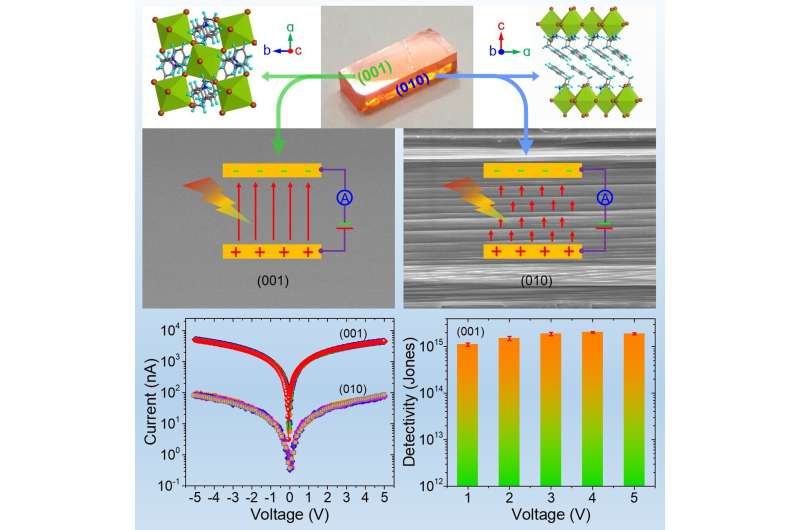New technique prepares 2-D perovskite single crystals for highest photodetectivity

A research group led by Prof. Liu Shengzhong from the Dalian Institute of Chemical Â鶹ÒùÔºics (DICP) of the Chinese Academy of Sciences and Dr. Xu Zhuo at Shaanxi Normal University (SNNU) developed a technique to prepare large 2-D perovskite single crystals to achieve the highest photodetector performance among this type. Their findings were published in Matter.
Due to their promising stability and excellent optoelectronic properties, two-dimensional (2-D) layered organic-inorganic hybrid perovskites have demonstrated better performance in certain applications than their three-dimensional (3-D) counterparts. In particular, 2-D perovskites show better performance in certain optoelectronic devices, especially ones fabricated on the (001) plane.
The scientists developed a surface tension-controlled crystallization method to prepare large 2-D (C6H5C2H4NH3)2PbI4 ((PEA)2PbI4) perovskite single crystals (PSCs). Using this technique, they harvested inch-sized 2-D (PEA)2PbI4 PSCs, with the largest reaching 36 mm in length, resulting in extraordinary device performance.
As predicted using density function theory, their crystal structures show anisotropy-dependent optoelectronic performance. More specifically, the photodetectors fabricated on the (001) plane exhibit responsivity as high as 139.6 A/W, external quantum efficiency of 37,719.6%, detectivity of 1.89 × 1015 cmHz 1/2/W and response speed as fast as 21 microseconds.
These results provide a promising pathway for stable high-performance photodetectors and open a new avenue for commercialization of perovskite single crystals for photoelectronic applications.
More information: Yucheng Liu et al, Surface-Tension-Controlled Crystallization for High-Quality 2D Perovskite Single Crystals for Ultrahigh Photodetection, Matter (2019).
Provided by Chinese Academy of Sciences





















